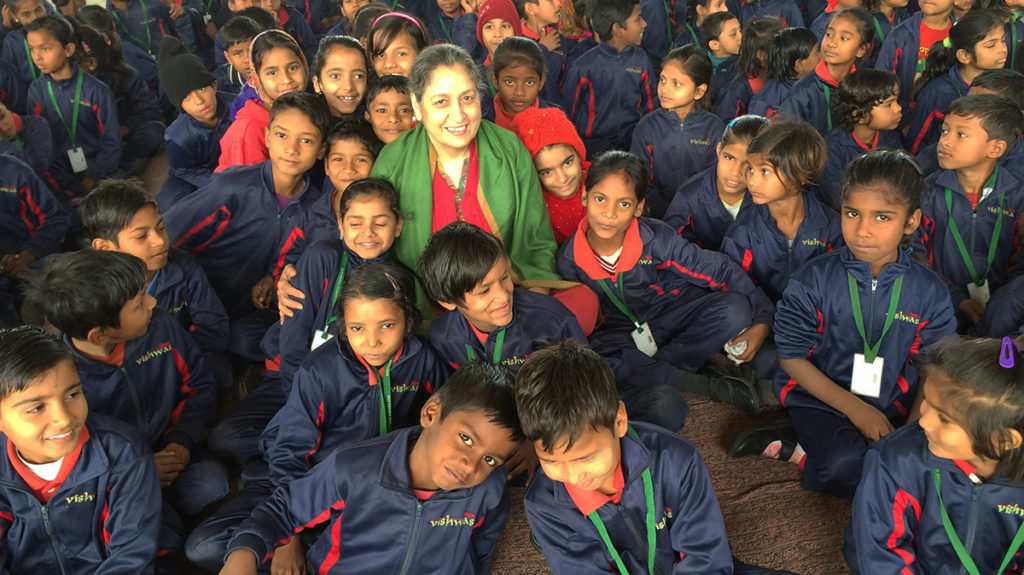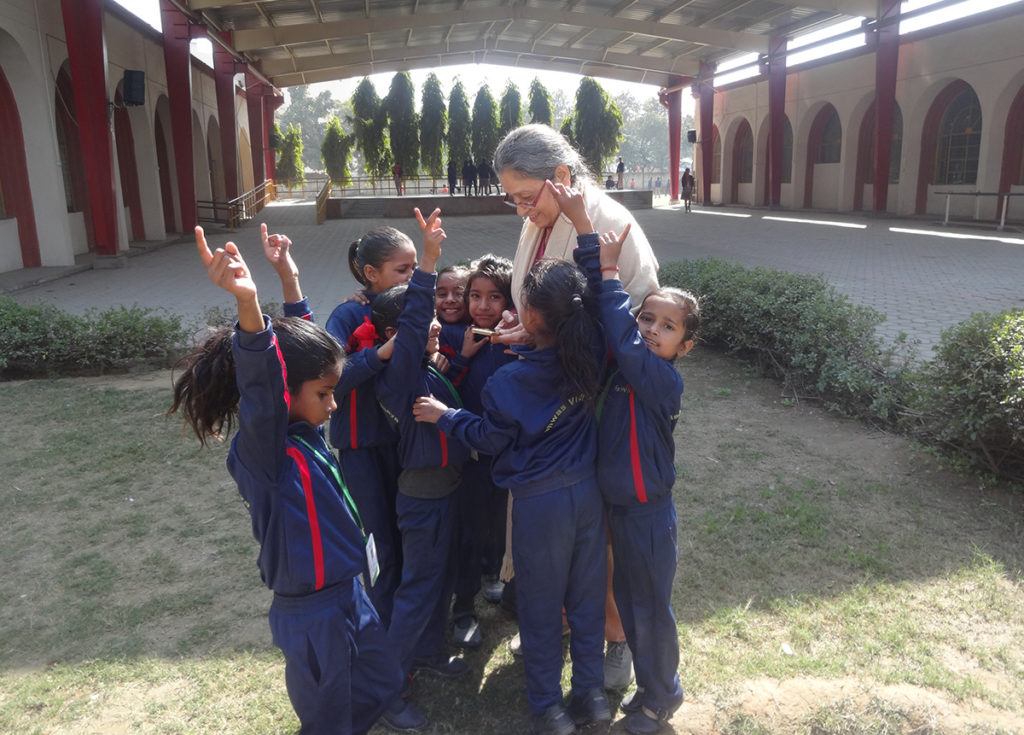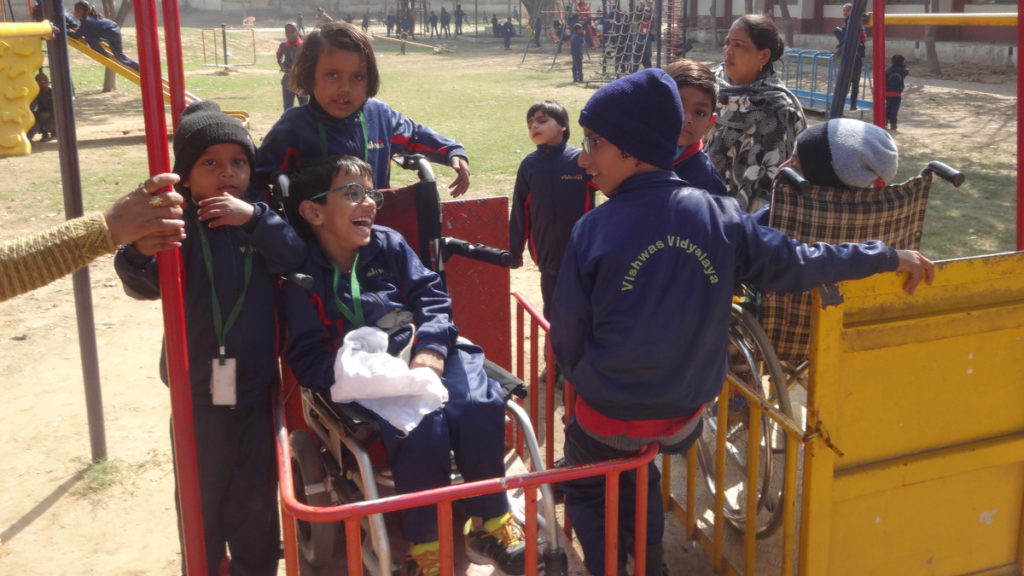WHEN Neelam Jolly, a post-graduate in biophysics, changed track and trained to become a therapist, she was exposed to the needs and problems of children with disabilities from close quarters. This pushed her to dream of an organisation that would work for special needs children – where they are made to feel an integral part of mainstream society through inclusivity.
In 2005, Neelam took the big leap of faith and set up VISHWAS in a small building in Saanp Ki Nangli village in the Gurugram district of Haryana. Soon, they turned a vandalised and abandoned building into a fully functioning school and resource centre for children of migrant communities and the marginalised – with 17% of the students in the school being children with disabilities.
Here, Neelam tells us about her inspiring journey, the school and her life outside the organisation.
Give: Did you have an epiphany or a moment of revelation that led you to start VISHWAS? Tell us about the journey.
Neelam Jolly: It all started with an advertisement in the newspaper way back in 1988 from Action for Ability Development and Inclusion (then the Spastic Society of India) which was planning to start a one-year course in Basic Development Therapy. At the time, I was looking for a change in my field from biophysics to something more manageable and equally satisfying.
I was called for an interview and asked to spend one week with the children there to see if I could cope – it was my first exposure to disability. I was very upset for the first two to three days, seeing some of the very high need children who were not able to eat, swallow or sit properly. But then I also noticed they were smiling, playing, and exchanging notes on cricket in their own sign language. So I finished my one-year course with a lot of hands-on training, worked there for a couple of years and that brought me the confidence to later venture out on my own.

So, I decided to take the plunge and founded my own organisation which would be inclusive and also reach the unreached in far-off communities. That is when the journey of VISHWAS started, with nothing – no resources, no team, no fixed premises. Just an idea and a dream. Today, VISHWAS has reached out directly to 2,500 children and persons with disabilities through its various programmes and many more children without disabilities.
Give: What are the challenges when it comes to implementing inclusivity in schools and employment opportunities?
NJ: The needs of children with disabilities are not addressed holistically in most regular educational setups, be it schools, colleges, or professional institutions. I believe children with and without disabilities have to be together in school from the very beginning which gives them the confidence to get to know and feel the real world around them.
Some of the challenges of inclusive education are the negative attitude of parents, teachers, and community, low enrolment and high dropout rate of children with disabilities, lack of qualified and trained teachers, inadequate and inaccessible infrastructure, and the lack of political will towards Implementation of policies. At VISHWAS Vidyalaya, our experience shows inclusion is really beautiful in spite of these challenges.
And when it comes to employment, there is a huge gap between intent and practice for persons with disabilities. Why do you think corporations or governments are not able to fill the 4% of jobs they reserve for them? Giving them due respect and also making reasonable and necessary accommodations can make a workplace more inclusive and enabling and we are working towards that.
Give: How has the pandemic affected the organisation and its work? In what ways are you trying to overcome the setbacks?
NJ: In the beginning, we were all shaken. We also found it really challenging as our students, with or without disabilities, come from economically weaker sections, many of them belonging to migratory families. Some had gone back to their villages. Many parents lost their jobs. Slowly, we mobilised financial support to some and also guided them to access relief wherever it was available.
Online teaching and consultations emerged as the way forward but those from underprivileged backgrounds found it difficult to transition to remote learning as not everybody has smartphones. We used tele-rehabilitation for our children and adults with disabilities but could not convince the parents sufficiently. It was not easy for us either but our staff worked very hard to turn it into reality.

Some parents who even under normal circumstances used to find it difficult to come for the sessions now say they benefited by getting answers to their problems sitting at home. This has given us confidence that we can run some of our programmes remotely. As time passed, we were totally engrossed in the virtual world, be it teaching, therapy, training, webinars, or even board meetings. But the fact is that we are all longing for the return of the old normal.
Give: What is the most heart-touching thing that has happened to you through your NGO?
NJ: Our inclusive classes have children with and without disabilities learning, playing, and eating together. Some of them do need support which is happily provided by our staff and also by their peers in the class. Once we had a really good volunteer who would sit with children during lunchtime, and teach them to thank God for giving them this meal. Two children were not listening and kept on jumping around due to their challenges. Seeing her looks of exasperation, a boy got up and reassuringly said, “Ma’am, they will sit on their own in a little while, you don’t worry.” I was so touched that I had tears in my eyes seeing the little boy understood them better than we adults, and I thought we actually were making a difference by sensitising them and initiating a small but much-needed change in our social outlook.
Give: What three things help you stay active and motivated?
NJ: Everyday smiles of our children and cheerful good mornings, which I am really missing these days. The achievements of our kids – like our first child with disability clearing class ten, another girl from an underprivileged background securing 89% marks in her 10th board, our first five students with disabilities who did their one-year course in hospitality just before the pandemic began…Seeing them reach greater heights keeps me stay motivated the most.

Give: You have been forced to eat only four things for the rest of your life. Which four items would you choose? And why? Are there any memorable associations with it
NJ: I love to eat dal and rice with mango pickle, some raw onions, and curd all the time, Punjabi style shalgam, makki ki roti with a dash of butter, and lassi. These are my childhood memories and my mother made them the best. Sadly, she has gone, but we cherish her memory of always giving us the best simple food which is today’s health fad. And of course, my favourite mini-chocolate eclairs filled with vanilla bean pastry cream and carrot walnut cake made by my daughter who is a pastry chef.
Give: When it gets safe to travel, which three places would you love to visit and why?
NJ: Oh, God! How desperate I am now more than ever before to just pack my bags and run away to any place with lots of greenery, the gentle sound of flowing water, and birds chirping. The first on my list is Gulmarg in the Kashmir valley. The second would be Lake District in England to have long uninterrupted walks where you suddenly discover a waterfall or a shiny blue water body where you see birds taking a dip and third would be Mashobra in Himachal where in addition to its own beauty, there is a nice thick protected forest for which you need to take a special permit. This walk on small trails is heavenly as there’s no tourist noise, no filth, and plastic lying around.
Interviewed by Sruthy Natarajan
–
Give’s mission is to “make giving bigger and better.” Give is the most trusted donation platform in India for fundraisers and crowdfunding campaigns. Through our technology solutions, we enable individuals and organisations to fundraise and donate to a cause, charity or NGO with trust and convenience. Give’s community of 2.7M+ individual donors and 300+ organisations supports 3,000+ verified nonprofits with 80G deduction and serves 15M+ people across India. Find a fundraiser today!
Discover more from
Subscribe to get the latest posts sent to your email.

